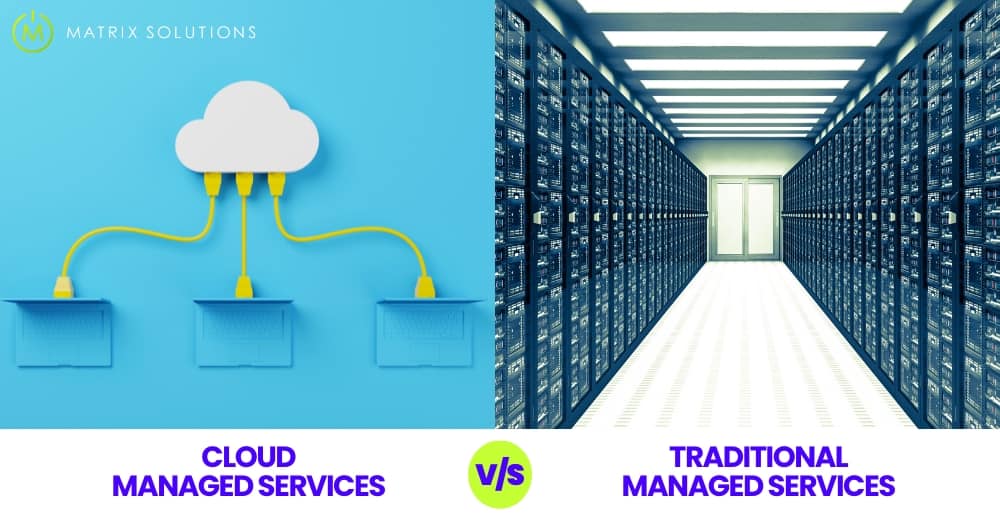Regardless of their scale, businesses and enterprises have become deeply dependent on technology. To optimise operations, elevate efficiency, and attain their goals precisely, they must opt for the significance of Managed Service Providers (MSPs).
An MSP is an extension of your business’s IT team, offering specialised expertise to ensure optimal technology utilisation. So, How do you choose an MSP for your business? Matrix Solutions, a provider of managed IT services, aims to help you understand their roles and importance and choose the right MSP for your business type.
In basic terms, Managed Service Provider (MSP) refers to outsourcing IT services. It is a third-party company that manages a customer’s Information Technology (IT) infrastructure and end-user systems remotely.
MSPs are primarily responsible for overseeing or providing Information Technology (IT) services like infrastructure, security, networking, and applications. However, in today’s context, a contemporary managed service provider also handles diverse business requirements for an organisation, including staffing, payroll, customer engagement, and vendor management.
The Role of MSPs
MSPs play a pivotal role in modern business operations by providing specialised managed IT services that enable companies to focus on their core competencies. Instead of diverting valuable resources towards maintaining and troubleshooting IT systems, businesses can delegate these tasks to MSPs. This approach allows organisations to stay competitive in the market while leaving the intricacies of IT management to the experts.
Common MSP Programs include:
- Hiring different types of temporary and project-based workers.
- Building pools of high-quality candidates.
- Reviewing current supplier and vendor contracts.
- Managing contracts.
- Providing reporting and analysis about the temporary workforce.
- Overseeing the companies that supply these temporary workers.
- Handling the bills and payments for the staffing companies.
- Advising about important job market trends.
- Teaming up to create special workforce plans that match what the client needs.
The Functioning of MSPs
Managed Service Providers (MSPs) operate through a proactive approach. They monitor IT systems around the clock, identifying and addressing potential issues before they escalate into major problems. Their tasks include like:
- Project Management: MSPs drive and manage projects, ensuring resource allocation, schedule adherence, and budget control. They utilise tools like remote monitoring and management (RMM) for effective project tracking.
- Auditing and Assessment: MSPs conduct thorough audits of existing IT systems to identify strengths and weaknesses. This assessment guides them in implementing suitable solutions and support strategies.
- Integration Expertise: MSPs understand the intricate relationships between technology and critical systems, offer advice on best practices, and assess the impact of various support activities on overall operations.
- Strategic Guidance: MSPs provide strategic insights, helping businesses align technology with their goals and objectives. They offer guidance beyond mere task execution.
- Compliance Assurance: MSPs aid in solution design and management in compliance-driven industries to ensure businesses adhere to regulatory standards while utilising technology effectively.
- Process Enhancement: MSPs evaluate existing environments to suggest improvements and automation opportunities, enhancing overall operational efficiency.
- Supporting Business Initiatives: Beyond routine support, MSPs assist in achieving business objectives. They understand your goals and leverage technology to advance initiatives effectively.
Each of these functions showcases the depth and value that MSPs bring to businesses by managing technology and strategically contributing to their growth and success.
What are the Types of MSPs?
Managed Service Providers (MSPs) offer businesses, organisations, and individuals a wide range of IT and technology-related services. These services Primarily handle various aspects of technology management, allowing clients to focus on their core activities while outsourcing their IT needs.
There are several different types of MSPs, each specialising in specific areas. Here are some common types:
Cybersecurity MSPs
These focus on safeguarding businesses from cyber threats by implementing robust security measures and monitoring systems for any signs of breaches.
Infrastructure MSPs
They manage and maintain IT infrastructure, including servers, networking, and cloud solutions, ensuring optimal performance and scalability.
Application MSPs
These providers focus on managing specific software applications, ensuring they run smoothly and are up to date.
Why Should Your Business Use an MSP?
Small to medium-sized businesses (SMBs) are typically managed service provider customers. Many smaller companies have limited in-house IT capabilities, so a managed service provider can be a great way to obtain additional IT expertise.
The in-house staff is generally responsible for various tasks, from installing and configuring new systems and software to providing technical support across the organisation. However, their proficiency in handling these responsibilities may vary, leading to a potential need for supplementary personnel.
Expanding the workforce comes with heightened expenses and involves a sequence of tasks encompassing candidate exploration, interview procedures, and the subsequent training of chosen individuals.
Hence, other than cost, there are many other advantages to working with MSPs and outsourcing your businesses’ day-to-day IT operations to the right provider.
Benefits of Working with an MSP
MSPs will offer you the following benefits:
- Expertise: MSPs possess specialised knowledge and experience in various IT domains, ensuring your technology infrastructure is in capable hands.
- Cost Efficiency: Outsourcing IT management can be more cost-effective than hiring an in-house team, especially for SMEs.
- Scalability: MSPs offer flexible solutions that can scale as your business grows, ensuring you have the necessary resources without overburdening your budget.
- Focus on Core Business: By offloading IT responsibilities, your team can concentrate on strategic business initiatives.
- Enhanced Security: Cybersecurity-focused MSPs can implement robust measures to protect your sensitive data from evolving threats.
Is MSP the Right Choice for You?
While MSPs offer numerous advantages, it’s essential to evaluate whether they align with your business needs and goals. Consider factors such as the complexity of your IT infrastructure, budget constraints, and the potential benefits of outsourcing IT management.
Challenges of Managed Services Providers
Despite their benefits, working with MSPs has challenges like communication issues, data security concerns, and potential dependency on external vendors. You must choose a reliable and transparent MSP to mitigate these challenges.
MSP vs. Traditional IT Support

Compared to traditional IT support, MSPs differ significantly in their approach. They provide ongoing, proactive management rather than reactive troubleshooting. This preventive approach leads to improving the system’s reliability and minimising downtime.
Traditional support is reactive, addressing issues as they arise, while MSP offers constant, proactive monitoring to predict and prevent disruptions. MSP provides specialised expertise, scalability, and contractual SLAs for issue resolution. This approach enables businesses to focus on strategic projects. Traditional support suits simpler IT needs and can be either in-house or outsourced.
However, as is often the case, the decision relies on the preferred extent of proactive management and the intricacy of IT demands.
What is the Pricing Model for Managed Service Providers?
MSPs typically offer various pricing models, including fixed monthly fees or pay-as-you-go options. The pricing structure often depends on the services provided, the complexity of the IT environment, and the level of support required.
Matrix Solutions: Your Trusted MSP Partner
Matrix Solutions specialises in customised outsourced IT services tailored to your business’s needs. Our proficiency in document management systems such as NetDocuments, cybersecurity, and managed cloud services makes us a dependable ally for SMEs seeking access to enterprise-level technological solutions. Our commitment to excellence ensures your business’s IT requirements meet the highest standards of care and innovation. Contact us for a free consultation.
Conclusion
In conclusion, a Managed Service Provider is a valuable partner for businesses aiming to leverage advanced technology without the burden of intricate IT management. By outsourcing IT responsibilities to experts, companies can enhance productivity, security, and competitiveness in their respective industries. As the technological landscape evolves, MSPs will play an increasingly vital role in driving business success.
MSP Frequently Asked Questions
What is an MSP example?
Examples of Managed Service Providers (MSPs) include various services like:
- watching over computer networks,
- ensuring security,
- managing virtual systems,
- planning for emergencies,
- taking care of applications and technology connections
They help keep things running smoothly for businesses.
What does a Managed Service Provider (MSP) do?
MSPs handle IT management tasks such as system monitoring, updates, security, and performance optimisation.
What is the difference between an MSP and a Cloud Service Provider?
While MSPs manage various IT services of an organisation. Meanwhile, Cloud Service Providers focus on offering cloud-based infrastructures and services like IAAS, PaaS and SAAS.
What is a managed service provider in the staffing industry?
In the context of recruitment and staffing, a Managed Service Provider (MSP) is a company or entity that oversees and manages an organisation’s entire contingent workforce and staffing processes.
An MSP in recruitment/staffing simplifies complex workforce management and allows businesses to focus on their core operations while benefiting from expert talent management solutions.










